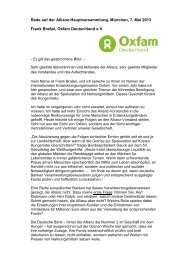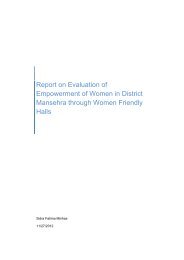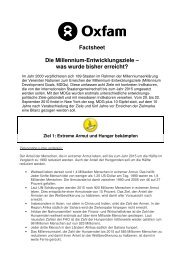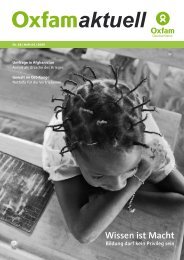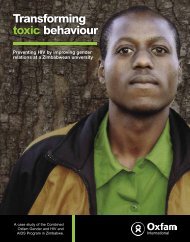FOOD CRISIS IN THE HORN OF AFRICA - Oxfam International
FOOD CRISIS IN THE HORN OF AFRICA - Oxfam International
FOOD CRISIS IN THE HORN OF AFRICA - Oxfam International
Create successful ePaper yourself
Turn your PDF publications into a flip-book with our unique Google optimized e-Paper software.
distribution. Where shallow wells can be dug or<br />
cleaned out, <strong>Oxfam</strong> can pay communities to dig<br />
them. Trucking water is expensive and is used<br />
only as a short-term measure, so water might be<br />
trucked to communities while a local supply is<br />
found or a pipeline is run in from another source.<br />
Sanitation and hygiene promotion activities<br />
were largely restricted to camps for internally<br />
displaced people and places where displaced<br />
people were crowded together. The link between<br />
poor hygiene and malnutrition is strong in<br />
overcrowded environments, especially where<br />
people are used to living in more spacious rural<br />
environments. The risks of disease are high, as<br />
diarrhea inhibits the absorption of food and can<br />
set off a downward spiral of physical decline<br />
which can kill very young, old, or sick people.<br />
The sprawling settlements along the Afgoye<br />
corridor constitute a huge displacement camp,<br />
where partners’ public health teams have been<br />
constantly employed in siting and maintaining<br />
latrines, mobilizing community groups to<br />
run campaigns promoting good hygiene and<br />
awareness of the most serious diseases, such<br />
as cholera, and distributing basic hygiene items<br />
like soap.<br />
Given that WASH is one of <strong>Oxfam</strong>’s principal<br />
professional competencies, it was frustrating not<br />
to be able to provide the level of direct technical<br />
support desired. However, <strong>Oxfam</strong> carried out<br />
detailed monitoring of its partners’ activities,<br />
which included water quantity and quality,<br />
physical facilities, latrine coverage, what essential<br />
hygiene items had been distributed, how the<br />
needs of men and women had been specifically<br />
met, and how the beneficiary communities had<br />
been involved in the whole process.<br />
Over the first nine months of this response,<br />
<strong>Oxfam</strong> supported more than 980,000 people<br />
in Somalia specifically with clean water- and<br />
health-related activities.<br />
Why give cash in a famine?<br />
In areas where there is some food production<br />
or there are existing trade routes bringing it in,<br />
<strong>Oxfam</strong> always advocates giving people cash to<br />
enable them to buy their own food, rather than<br />
taking on food distributions of its own. Contrary<br />
to what the term ‘famine’ implies, in Somalia’s<br />
case the problem was not that there was no food<br />
available: markets were still functioning, selling<br />
local and imported food – but at high prices.<br />
<strong>Oxfam</strong> therefore took the decision to inject cash<br />
into the economy, giving the most vulnerable<br />
households the wherewithal to buy what they<br />
needed. The organization worked with partners<br />
in Juba, Gedo, Lower and Middle Shabelle, Hiran,<br />
Banadir, and Mogadishu to identify beneficiaries,<br />
prioritizing families with highly malnourished<br />
children and female-headed households. Then it<br />
used local remittance companies to manage the<br />
disbursements of cash, in amounts of between<br />
<strong>Oxfam</strong> partner Hijra has<br />
been providing safe<br />
drinking water, sanitation<br />
facilities, and public<br />
health advice, to over one<br />
hundred thousand people<br />
living in makeshift camps.<br />
Part of this involves setting<br />
up street signs promoting<br />
good hygiene practice.<br />
Photo: Caroline Gluck.<br />
11


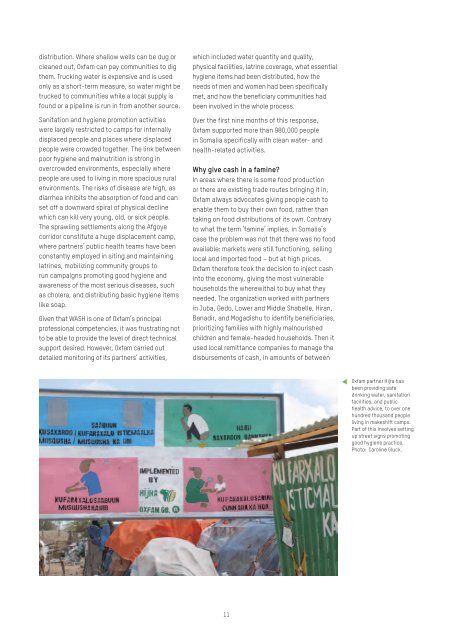
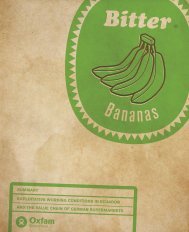

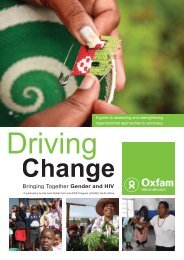
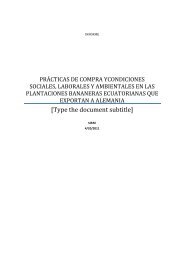
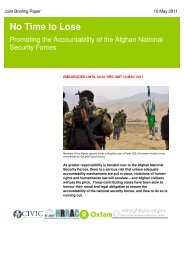
![Download: Faltposter EU-Handelspolitik [PDF 2,17MB] - Germanwatch](https://img.yumpu.com/25095854/1/190x161/download-faltposter-eu-handelspolitik-pdf-217mb-germanwatch.jpg?quality=85)
